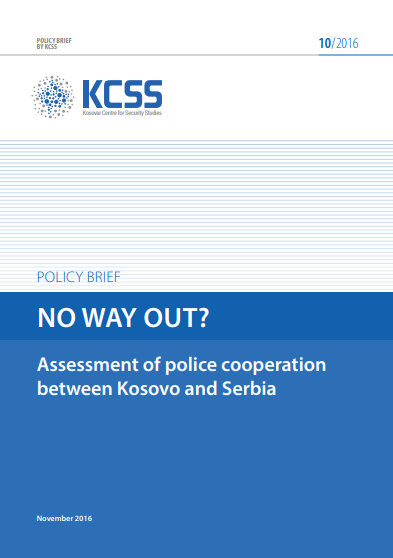29/11/2016

Countries aspiring for membership into the European Union (EU) are required to foster good neighbourly relations. Sound inter-state relations contribute towards the enhancement of regional security and cooperation. In the context of the Western Balkans, police cooperation is considered one of the most important aspects as it serves the purpose of peace and stability. Hence, membership into the EU is conditioned, among other factors, with the enhancement of multilateral and bilateral security cooperation. The progress is measured through different mechanisms set up by the EU and other international organisations. While there has been an advancement in bilateral cooperation and multilateral cooperation through regional initiatives in general, a large gap remains due to the limited security cooperation between Kosovo and Serbia. This state of play is driven by the political factors over Serbia’s refusal to recognise Kosovo, and the activities it undertakes to thwart its representation in the international system. This is despite contrary agreements and overshadows the potential of security cooperation. Furthermore, the ongoing refusal to formally recognise Kosovo as a sovereign state should not mark an obstacle to police cooperation, as this is for the benefit of both countries and people.
This report examines the limited and mediated police cooperation between Kosovo and Serbia. Its primary intention is to advocate for full cooperation, bearing in mind the joint nature of cross border challenges and EU conditionality, especially for Serbia. Data for this report was primarily gathered through desk research, analysis of the broader legal basis, reports and various local, regional and international articles. A considerable number of interviews with key stakeholders have been conducted in this field. Actors interviewed were mainly representatives of the Kosovo institutions, representatives of the Kosovo Police and representatives of the international missions present in Kosovo. Approaching the Ministry of Internal Affairs of Kosovo has been difficult, while it was even more difficult to maintain communication with the Ministry of Internal Affairs of Serbia.
This publication was supported by the Kosovo Foundation for Open Society (KFOS). All views expressed in this publication are only those of Kosovar Centre for Security Studies and of the author and do not necessarily represent the views of KFOS or other KCSS partners.